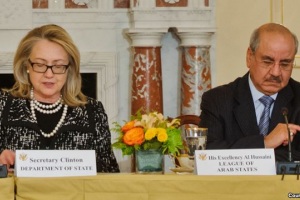Education Diplomacy: Hillary Clinton’s Global Learning Legacy

Last Monday, during her final week as Secretary of State, Hillary Clinton commanded the attention of a global education force field from the State Department, the Arab League, the Department of Education, and a group of representatives from other national and international education organizations and institutions with a simple, but radical idea–education diplomacy–and a road map of how to achieve it.
The Open Book Project, which Clinton announced in one of her final acts of diplomacy last week, is a concept that some might call naïve and others, brilliant. The project entails a U.S.-Arab League collaboration to provide a high level of access to freely available learning resources in Arabic which can be adapted and localized, with a particular emphasis on science and technology higher education. Said Clinton, “At a time when extremists everywhere work to deepen divides across cultures, we see partnerships like this as one chance to bridge them.”
The Open Book Project is built upon the widely successful practice of providing free access to open educational resources (OER), along with the tools for the collaborative creation, adaptation and remixing of resources, and extends this practice into the Arabic-speaking world. The Open Book Project heralds more than just a delivery system of English materials translated into Arabic. The real value of this project is the potential for collaboration among educators trained in the use of open education resources to modify, adapt, and create their own open content.
I had the honor to represent ISKME at last Monday’s announcement in Washington, D.C., as a “trailblazer in open education [whose] work is already proving that it has the potential to transform the way students learn across the world.” The philosophy behind the open education movement and OER Commons, where ISKME has amassed and curated over 40,000 high-quality resources for teachers and learners, is to make knowledge freely available to all and to support information sharing and continuous improvement of learning resources by leveraging educator expertise and experience.
As one of the partners in the Open Book Project, ISKME’s Arabic version of OER Commons is freely available throughout the English and Arabic-speaking world. Within OER Commons Arabic, educators can discover and share content, as well as author, remix, and translate content for their local instructional needs. It will soon feature a custom Arabic Language Learning Resources community, developed jointly by ISKME and a consortium with partners from the Center for Languages, Arts and Societies of the Silk Road (CLASSRoad) and the Language Acquisition Resource Center (LARC) at San Diego State University, offering up-to-date, accessible information about instruction, course materials, and opportunities for Arabic language educators and students, designers and administrators of Arabic language programs, and the general public.
Efforts such as OER Commons Arabic represent more than a one-way street: they seek to provide access to OER for Arabic-speaking teachers and learners, as well as for those who wish to learn about Arabic language and culture. This is what education diplomacy is all about and why the Open Book Project has a legacy that could help create understanding and respect for each other’s cultures. In this case, there is everything to gain and nothing to lose in translation.




